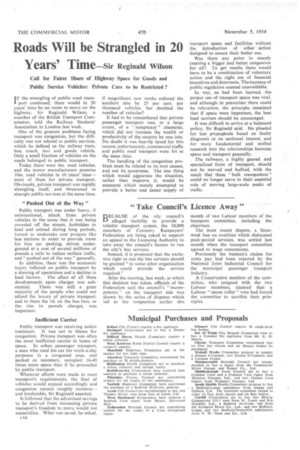Roads Will be Strangled in 20
Page 56

If you've noticed an error in this article please click here to report it so we can fix it.
Years' Time—sir Reginald Wilson Call for Fairer Share of Highway Space for Goods and Public Service Vehicles; Private Cars to be Restricted ?
IF the strangling of public road transt port continued, there would in 20 years' time be no room to move on the highway, Sir Reginald Wilson, a member of the British Transport Commission, told the Railway Students' Association in London last week.
One of the greatest problems facing transport was congestion, but the difficulty was not related to public services, which he defined as the railway train, bus, coach, taxi and goods vehicle. Only a small fraction of vehicles on the roads belonged to public transport.
Today there were 4m. road vehicles, and the motor manufacturers promise I0m, road vehicles in 10 years' time— most of them for private transport. Obviously, private transport was rapidly strangling itself, and threatened to strangle public services at the same time.
"Pushed Out of the Way"
Public transport was under heavy, if unintentional, attack from private vehicles in the sense that it was being crowded off the streets, forbidden to load and unload during long periods, forced to undertake cost projects like bus stations in order to provide room for free car parking, driven underground at a cost of several, millions of pounds a mile to reduce surface traffic, and " pushed out of the way" generally.
In addition, there was the economic injury inflicted on public transport by a slowing of operations and a decline in load factors. The effect of all these developments upon charges was substantial. There was still a great majority of the people who could not afford the luxury of private transport. and to them the ld. on the bus fare, or the rise in parcels charges, was important.
Inefficient Carrier
Public transport was receiving unfair treatment. It was not to blame for congestion. Private transport was often the most inefficient carrier in terms of space. In urban passenger transport, a man who used his car for work-a-day purposes in a congested area, and parked as necessary, occupied 16-40 times more space than if he proceeded by public. transport.
Whatever efforts were made to meet transport's requirements, the fleet of vehicles would expand accordingly and congestion remain roughly constant— and intolerable, Sir Reginald asserted, It followed that the advertised savings to be derived from increasing private transport's freedom to move would not materialize. What was saved, he asked, C14 if magnificent new works reduced the accident rate by 25 per cent, per thousand vehicles, but doubled the number of vehicles?
It had to be remembered that private passenger transport was, to a large extent, of a " sumptuary " character, which did not increase the wealth or productivity of the country by one. iota. No doubt it was heavily taxed for this reason; unfortunately, commercial traffic and public road transport were hit at the same time.
The handling of the congestion problem must be related to its root causes, and not its symptoms. The one thing which would aggravate the situation, rather than improve it, would be measures which merely attempted to provide a better and easier supply of transport space and facilities without the introduction of other action designed to secure their better use.
Was there any point in merely creating a bigger and better congestion for all? To get results there would have to be a combination of voluntary action and the right use of financial incentives and deterrents. The increase of public regulation seemed unavoidable,
In war, as had been learned, the proper use of.transport space was vital, and although in peacetime there could be relaxation, the principle remained that if space were important, the best load carriers should be encouraged.
It was difficult to arrive at a balanced policy, Sir Reginald said, He pleaded for less propaganda based on faulty diagnosis or on sectional interest, and for more fundamental and unified research into the relationships between space and transport generally.
The railways, a highly geared and specialized form of transport, should not be starved and bullied, with the result that these "bulk transporters " could no longer servein their essential role of moving large-scale peaks of traffic.




















































































































